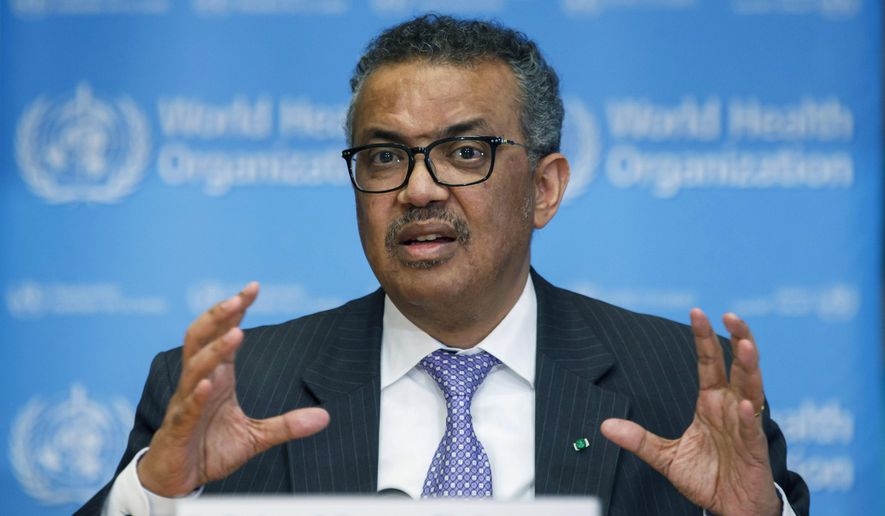The World Health Organization pushed member countries Monday to join a campaign to vaccinate 10% of the global population by September and 30% by December, dubbing the shortfall of COVID-19 shots in poorer places a “scandalous inequity” that is prolonging the pandemic.
Tedros Adhanom Ghebreyesus, the WHO’s director-general, said the September goal translates to 250 million more vaccinations in low- and middle-income countries and that the prominent vaccine-sharing alliance COVAX is the main route for getting there.
He said wealthier nations must ramp up donations by June and asked drugmakers to give COVAX the right of first refusal on 50% of their output this year.
“I understand that every government has a duty to protect its own people. I understand that every government wants to vaccinate its entire population,” Mr. Tedros said in remarks to the 74th World Health Assembly. “That’s what we want, too. And in time, there will be enough supply for everyone, including those at lower risk. But right now, there is not enough supply. Countries that vaccinate children and other low-risk groups now do so at the expense of health workers and high-risk groups in other countries. That’s the reality.”
The U.S. got off to a relatively fast start in its vaccination campaign, leveraging bilateral deals with drugmakers to get at least one dose into about half of the population. About 40% of the country has completed its vaccination course.
President Biden is under pressure to share U.S. vaccines with others, so he pledged to export 20 million doses of vaccines approved for emergency use in America and 60 million doses of AstraZeneca doses that aren’t approved and sitting on shelves. Experts said the commitment was a step in the right direction but short of what’s needed.
Mr. Tedros said more than 75% of all vaccines have been administered in just 10 countries, as places such as the United Kingdom and Israel pivot to normal, but many poor countries have barely begun their vaccination campaigns.
“There is no diplomatic way to say it: a small group of countries that make and buy the majority of the world’s vaccines control the fate of the rest of the world,” Mr. Tedros said.
Beyond donations, he said, some factories can scale up manufacturing if originator companies are willing to share their technology and know-how, a so-called patent waiver.
“I find it difficult to understand why this has not happened yet,” Mr. Tedros said.
Mr. Biden endorsed the patent idea, but it ran into a wall of skepticism and opposition from Europe and congressional Republicans in the U.S.
Mr. Tedros also said there is an $18.5 billion funding gap in the ACT Accelerator, a program that helps countries ramp up their local virus-fighting efforts.
In blunt terms, the director-general said the consequence of a slow vaccination effort could be a kind of never-ending pandemic in which the virus pings around the globe and evolves into something more dangerous.
“Almost 18 months into the defining health crisis of our age, the world remains in a very dangerous situation,” Mr. Tedros said. “As of today, more cases have been reported so far this year than in the whole of 2020. On current trends, the number of deaths will overtake last year’s total within the next three weeks.”
He said things are looking up in some countries, but no one should take a victory lap.
“No country should assume it is out of the woods, no matter its vaccination rate,” Mr. Tedros said. “So far, no variants have emerged that significantly undermine the efficacy of vaccines, diagnostics or therapeutics. But there is no guarantee that will remain the case. This virus is changing constantly. Future changes could render our tools ineffective and drag us back to square one. We must be very clear: The pandemic is not over, and it will not be over until and unless transmission is controlled in every last country.”
Taiwan, meanwhile, accused Mr. Tedros of not living up to his duties. The island country was not invited to the World Health Assembly despite support from the U.S. and many other nations.
Its foreign minister, Jaushieh Joseph Wu, issued a formal statement expressing “regret at the WHO Secretariat’s continued indifference to the health rights of Taiwan’s 23.5 million people.”
The snub will fuel claims WHO is far too deferential to Beijing — as calls grow for a truer probe into the virus’ origins in China — and does so at Taiwan’s expense. The communist government refuses to recognize the island’s sovereignty and considers it a rebel province.
“The recent escalation of the pandemic in Taiwan further shows that viruses know no borders,” Mr. Wu said. “Taiwan cannot remain on the sidelines, and there should not be a gap in global disease prevention. The world needs to share all available information and expertise in a collective fight against disease. That Taiwan has not received an invitation to attend the WHA is not only a loss for Taiwan but also the rest of the world.”
• Tom Howell Jr. can be reached at thowell@washingtontimes.com.




Please read our comment policy before commenting.